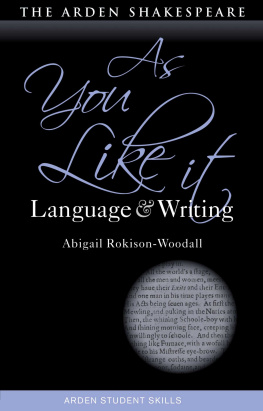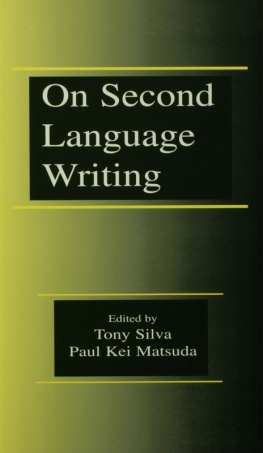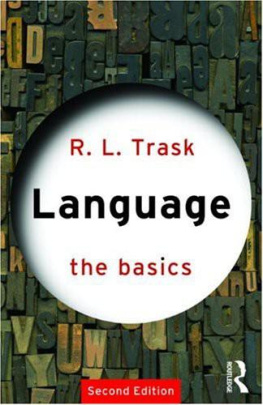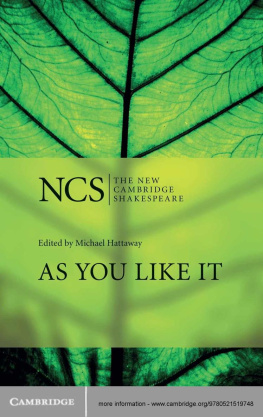
As You Like It
ARDEN STUDENT SKILLS: LANGUAGE AND WRITING
Series Editor
Dympna Callaghan, Syracuse University
Published Titles
Antony and Cleopatra, Virginia Mason Vaughan
Hamlet, Dympna Callaghan
King Lear, Jean E. Howard
King Richard III, Rebecca Lemon
Macbeth, Emma Smith
A Midsummer Nights Dream, R. S. White
Much Ado about Nothing, Indira Ghose
Othello, Laurie Maguire
Romeo and Juliet, Catherine Belsey
The Tempest, Brinda Charry
Twelfth Night, Frances E. Dolan
Forthcoming Titles
The Winters Tale, Mario DiGangi

CONTENTS
| RSC | Royal Shakespeare Company |
| NT | National Theatre |
| OED | Oxford English Dictionary |
| F1 | Folio 1 |
| Ham. | Hamlet |
| 1H4 | King Henry IV, Part 1 |
At first glance, the play of As You Like It does not seem particularly controversial or seditious. There is little violence, no bloody deaths of the type found in most of Shakespeares tragedies and no explicit sexual content. Indeed, a censor akin to those on a modern film classification board might be forgiven for considering the play universally suitable for a general audience. And yet, there is something mysterious about the early history of As You Like It which seems to suggest that it was deemed unsuitable for publication in the early 1600s. The first reference to the play appears on 4 August 1600, in what is known as a staying order in the Stationers register. A staying order is an expression of intent to publish a play which prevents anyone else from printing it, and this particular order was for four plays all owned by the theatre company of which Shakespeare was a member, The Lord Chamberlains Men Henry V, Much Ado About Nothing, as well as a play by Shakespeares contemporary Ben Jonsons Every Man in His Humour and As You Like It.
4 Augusti
As yow like yt: / a booke
Henry the ffift: / a booke
Euery man in his Humor. / a booke to be staied
The cmedie of muche
A doo about nothinge. / a booke
However, unlike the other three plays, which were printed shortly after being staied, As You Like It had to wait another twenty years to appear in print. We dont know why the play wasnt printed in 1600, but one possible explanation is that the censor didnt approve of the satirical character of Jaques whose name could be pronounced Jakes, slang for lavatory. It is, however, not merely the mild toilet humour that is likely to have offended the censor, but the connection between the word Jakes and the political landscape of the early 1600s. In 1596, Sir John Harington, godson to Elizabeth I, had published a scatological satire about his invention of the water closet, entitled The Metamorphosis of Ajax (A Jaks/A Jakes). Harington was out of favour with the queen because of his associations with the Earl of Essex. The second Earl of Essex, Robert Devereux, had been a particular favourite of Queen Elizabeth I. However, in September 1599, following a failed campaign in Ireland, he returned to England without permission from the queen and was put under house arrest. In 1601 he mounted an attempted rebellion against Elizabeth and was executed for treason. It may be that a play that appeared to have links to Harington was deemed unpublishable.
Although the play was not published until 1623, the reference in the Stationers register helps us in dating the plays composition. As You Like It must have been written by mid 1600. This reference provides us with the latest date at which the play could have been written. To narrow down the window of composition, we must also establish the earliest possible date as which the play could have come into existence. This is usefully provided in the text of As You Like It itself, in a line spoken by the shepherdess Phoebe
Dead shepherd, now I find thy saw of might:
Whoever loved that loved not at first sight.
(3.5.823)
A saw is a wise saying, and this one comes from Christopher Marlowes poem Hero and Leander, which, whilst mostly written in around 1593, was not published until 1598. Although a number of critics have argued that Shakespeare may have had access to Marlowes poem in manuscript, there would have been little point in him inserting a direct quotation of this kind if it were not to be recognized by at least some of the audience as a tribute to his dead friend. So the play seems to have been written between 1598 and 1600.
The question of where the play was first performed also has some bearing on its dating. Some have argued that Jaques line All the Worlds a Stage (2.7.140) is a direct reference to the Globe Theatre, which opened in May 1599, and suggests that As You Like It was one of the first plays to be performed in the new space in mid to late 1599. Whilst the often quoted assertion that the Globe had a motto, Totus mundus agit histrionem (The whole world moves the actor; often mis-translated as All the worlds a stage) has now largely been discredited, as Gabriel Egan asserts, there is a tantalizingly suggestive correspondence between the name of the theatre, as something referencing the microcosmic correspondence of the world of drama and the world of everyday life (2001: 166) and the words that begin Jaques speech on this theme.
Juliet Dusinberre uses another of the plays lines to suggest a slightly earlier date of February 1599 for the plays first performance. Citing Touchstones quip about the certain knight that swore by his honour they were good pancakes, and swore by his honour the mustard was naught (the mustard was no good), Dusinberre suggests that the play may have been first performed at Richmond Palace on Shrove Tuesday (February) 1599 (2006: 40). Shrove Tuesday is a Christian feast day that takes place immediately before the start of Lent. It is traditional to eat pancakes (and other food made with butter and eggs) on this day, since these foods were usually given up during the Lenten period. Whichever of these original performance locations is correct, the cumulative evidence seems to date the play to between early 1599 and spring 1600. The dating of the play is important, as we will see, for discussions about the use of verse and prose, the nature of the Fool, the depiction of Rosalind and Celia, and the original staging conditions.
As You Like It is one of eighteen plays by Shakespeare that appears for the first time in 1623 in the collection of Shakespeares work entitled Mr. William Shakespeares Comedies, Histories, & Tragedies. This publication was put together by Shakespeares friends and colleagues John Hemminges and Henry Condell and is referred to as the First Folio of Shakespeares work (a folio being a large book of around 15 inches (38 centimetres) in height, a format usually reserved for prestigious works by leading theologians, historians and philosophers). The First Folio contained thirty-six of the plays, eighteen of which had been printed before in quarto form. Although the title page of the Folio claims that these plays are Published according to the True Original Copies, the copy texts (the documents from which the printers put together the play texts) vary in origin from quarto texts (small individual copies of the plays published during Shakespeares lifetime), manuscripts derived from authorial copy (that is the script in Shakespeares own handwriting, which does not survive), scribal copy (a clean copy of the play text made by a scribe) and prompt books (the copy of the play put together for use in the theatre).
Next page









